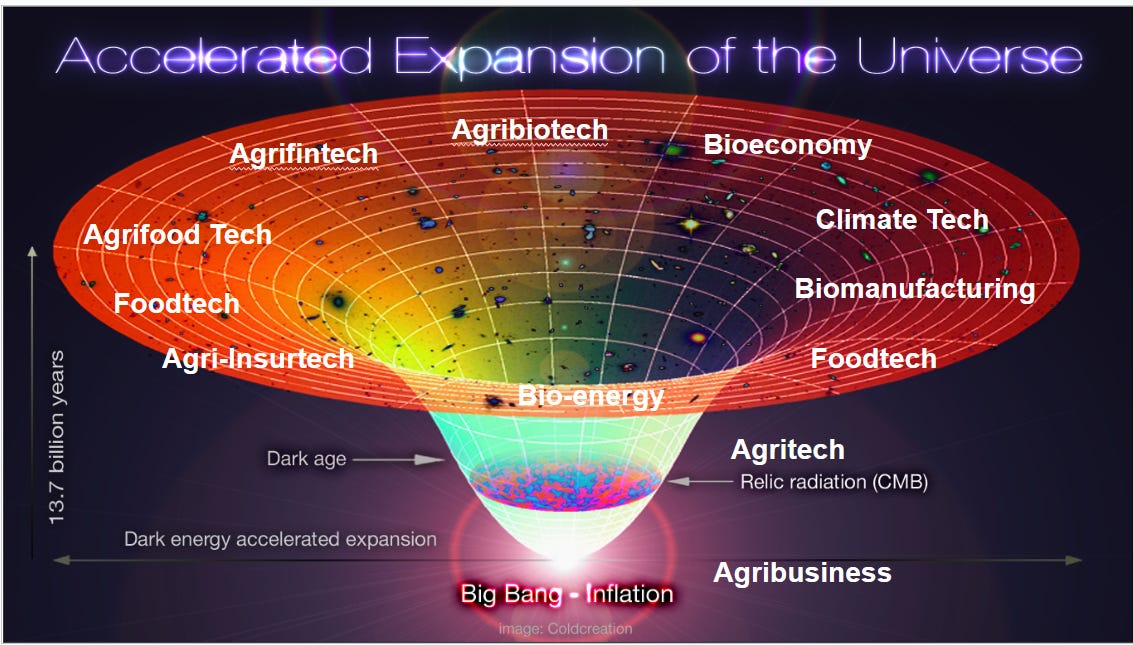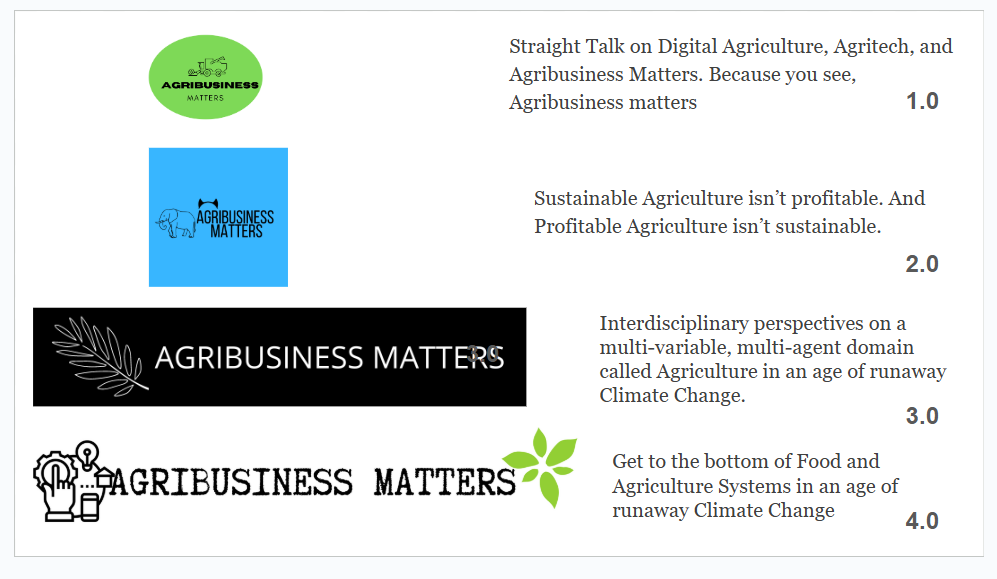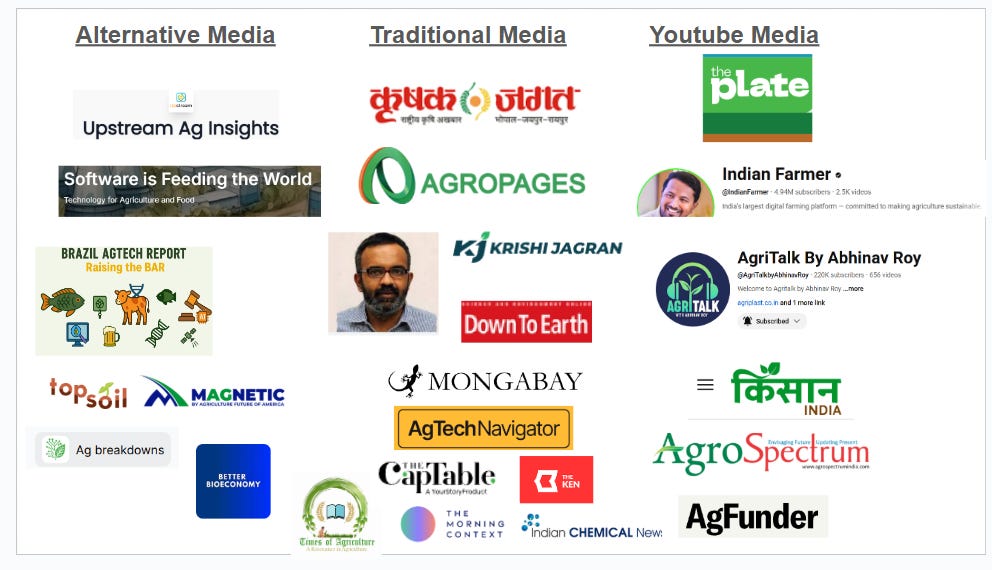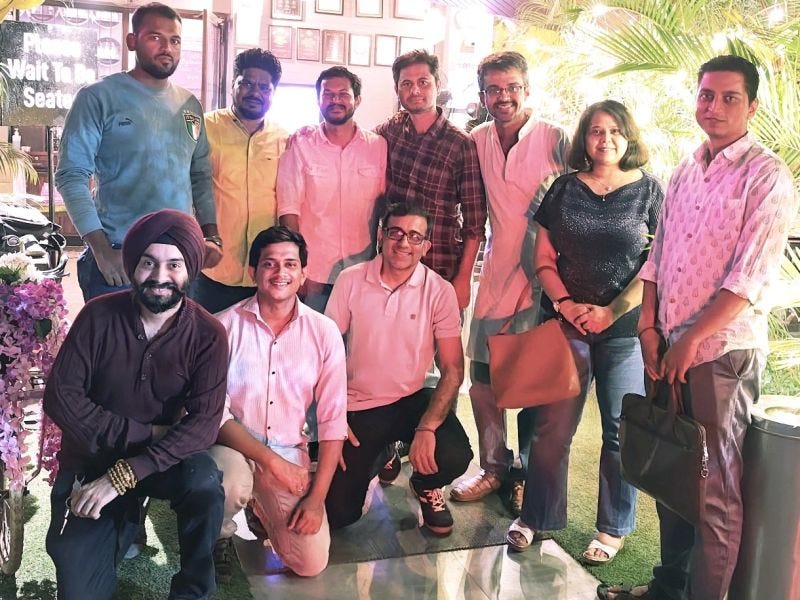Agribusiness Matters 5.0
My Impact Thesis -Agritech Ecosystem Engineering - takes the Center Stage.
In any experiment, there is an experimenter, a subject to be experimented upon and finally, a discovery. When you are doing solopreneurship, all the three roles belong to you.
Agribusiness Matters started out as a simple newsletter in June 2020 as an exhaust fume truth pipe emanating from the chemical reaction between agritech innovations and smallholding agrarian realities. Today, as we inch towards June 2025, we are at the cusp of entering Agribusiness Matters 5.0
In a domain where Time is the biggest leverage, Each newsletter byline marks a shift in how time shaped me and forged my work. If you’ve paid attention to my work, you would know this: For a newsletter titled “Agribusiness Matters”, my definition of Agribusiness has been intentionally fuzzy.
Why does all of this matter?
Back when I started, there were mostly
and I who were writing about agritech. Soon, I discovered ‘Software is Feeding The World’ and that was largely my universe.In my limited radar, of course.
As I read (to expand my ignorance) and wrote (to limit my knowledge), I discovered a fascinating constellation of founders, journalists, investors, theorists, scholars, activists writing about agriculture, gazing at this incredibly beautiful living system from diverse kaleidoscopes while the system was constantly being tinkered at the edges by my legion of technologists and builders.
Each kaleidoscope offered a perspective that was unique and yet incomplete. And hence I kept pushing boundaries until I felt I could discern the gestalt of the system.Today, there is a Cambrian explosion of content with agritech-climate tech-food tech-biotech universe expanding beyond my limited imagination.

Here is a quick and dirty (albeit incomplete) map of folks who are writing/speaking about food tech-climate tech - agritech- agribusiness - biotech right now as we speak. It is largely India focused and could get messier, if you expand to include the global agritech media landscape.
The question therefore remains: What is the need for yet another blog/newsletter? Why bother writing about agritech when you can get all form of content (including those sloppy ones you could generate through AI) anywhere at the click of a button?
Why bother paying for such a content ?
The answer lies in the seed of the question. Left to AI machines, Content quickly becomes meaningless as it can consume EVERYTHING.
What’s scary about this development is that this ghost is now devouring the entire substrate field of Meaning that allows humans to trust others and the world around them.
When words and images can no longer be trusted, our fundamental sensemaking process gets disrupted irreversibly and we end up sleepwalking our way to the road of nihilism where Meaning and Truth and Climate Change doesn’t matter.
I write because I care about, as one VC friend characterized my work recently, ‘maximal truth-seeking’. And that can happen only when content is moored by the truth of a lived human experience that exists inside the atomic unit of a community.
“A blog post is a very long and complex search query to find fascinating people and make them route interesting stuff to your inbox” - Henrik Karlsson
Today, when AI is fabricating content that doesn’t exist and the medium starts proof-checking its own message, we are architecting our shiny entrapment, locked inside the reality delusion fields of our own making.
To find a way out, we need to build sensemaking engines standing on a collective center of gravity that is composed of real humans working passionately to create impact in food and agriculture systems wearing various artisanal hats of their own making.
My Impact Thesis underpinning Agribusiness Matters 5.0 is the following:
Any complex problem can only be solved in ecosystem terms. Smallholding Agriculture is a wicked and complex problem. QED: You can solve agritech only in ecosystem terms (I elaborated it here)
Agritech Ecosystem Engineering requires 2Cs - both Content (Agribusiness Matters) and a Community of Changemakers/Agripreneurs pushing the boundary of the incumbent broken food and agriculture system that neither serves farmers, consumers nor the planet.
Why does it require Content? Content expands the possibilities of Impact. Why does it require Community? Communities constrain and actualizes the Impact.
Content Vector - > Every agritech innovation is therefore critically analyzed from the lens of: How would an ecosystem gaze at this innovation and technology? System Thinking Lens often comes close to this ecosystem lens. But not always.
Community Vector→ Every agritech innovation is mapped in a ecosystemic context. Every ABM Townhall I facilitate this development.
What happened in the case of Soil Testing last year is a classic case in point. I brought together several Indian Soil Testing players in one ABM Townhall “State of Soil Testing” → Several Soil Testing Players came together to become a part of the Agripreneur Community → Few of them came together to create Indian Soil Testing Alliance (spurred by the incredible efforts of Hemendra Mathur) to accelerate this agritech ecosystem engineering further. Agritech Ecosystem Engineering can benefit from structures of Consortiums/ Collaborations/ Alliances.
Community Vector: → Every Agripreneur Retreat I host with my Agripreneur friends accelerate Agritech Ecosystem Engineering. Having organized four retreats so far with my friends, I measure their ROI based on the amount of new companies/partnerships/JVs/collaborations they create among the Agripreneurs.
Community Vector → Every Agripreneur Meetup I host in various parts of the country drives agritech ecosystem engineering. Every city I travel to, including the upcoming Madurai, becomes an excuse to host an Agripreneurs Meetup.
Community Vector → Along with my Agripreneur friends, I have been managing a 300+ Agripreneur community that has become a powerful, real sensemaking tool that is increasingly shaping my views and perceptions about agritech innovations from the lens of founders.
Agritech Ecosystem Engineering increases the surface area of Impact. Traditional designs of food and agriculture systems have always had Community/Ecosystem as their central organizing design principle. (I talked about it here). And hence this is Lindy proof.
Without Agritech Ecosystem Engineering, the organizing logic of an emerging ecosystem is dictated by flows of the capital. With Agritech ecosystem engineering, the organizing is dictated by where the value aggregates organically in a value chain.
Although is difficult to align the interests of agritech founders and investors accurately- the more the founders’ interests are aligned; the less the investors’ interests are aligned and vice-versa. (explored in depth here) - Agritech Ecosystem Engineering becomes a win-win proposition for both Agritech founders and investors.
As I reboot Agribusiness Matters 5.0, if you resonate with these, you could do the following
a. Subscribe to accelerate my efforts in Agritech Ecosystem Engineering.
b. Jam with me to discover newer possibilities of agritech ecosystem engineering.
c. Become a Patron (third option when you hit subscribe) under Agribusiness Matters and sponsor agritech ecosystem engineering efforts.
d. Share with me your wisdom on how to make agritech ecosystem engineering scale beyond India across diverse smallholding contexts.
How happy are you with today’s edition?
I would love to get your candid feedback. Your feedback will be anonymous. Two questions. 1 Minute. Thanks.🙏
💗 If you like “Agribusiness Matters”, please click on Like at the bottom and share it with your friend.






